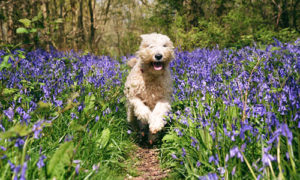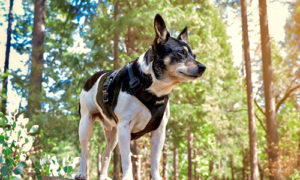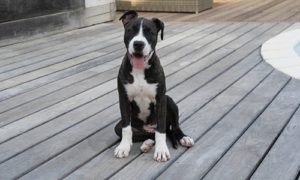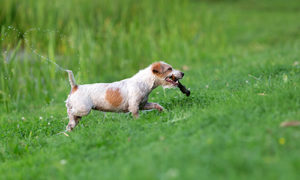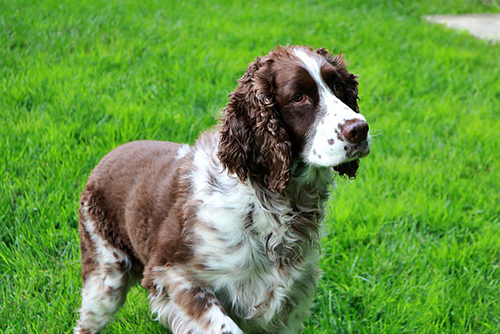
The English Springer Spaniel was recognized in Britain in 1902 and was introduced to North America about twenty years later. During the 19th century, spaniels from the same litter were separated by size into “cockers” (small dogs used for hunting woodcock) and “springers” (larger dogs used for flushing and retrieving game). Dual-type springers, bred for both the field and the show ring, vanished in the 1940s, resulting in a marked discrepancy between working and show lines.
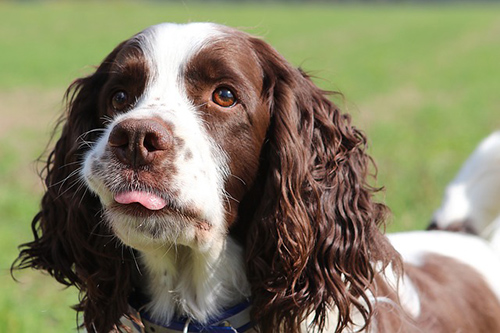
Breed Standard
The English Springer Spaniel is a medium-sized, sturdy, compact sporting spaniel with slightly rectangular proportions and an oval-shaped deep chest. Its long, muscular neck blends smoothly into a slightly sloping topline. The dog’s docked tail is kept slightly above the level of the back, merrily wagging. The skull is medium length, relatively broad, and flat on top. This spaniel’s characteristic kindly, trusting expression is produced by wide-set, oval-shaped eyes and long, wide ears set at the eye level and hang close to the head.
Breed Facts
| Energy level | Watchdog ability | ||
| Exercise requirements | Protection ability | ||
| Playfulness | Grooming requirements | ||
| Affection level | Cold tolerance | ||
| Friendliness toward dogs | Heat tolerance | ||
| Friendliness toward other pets | Friendliness toward strangers | ||
| Ease of training |
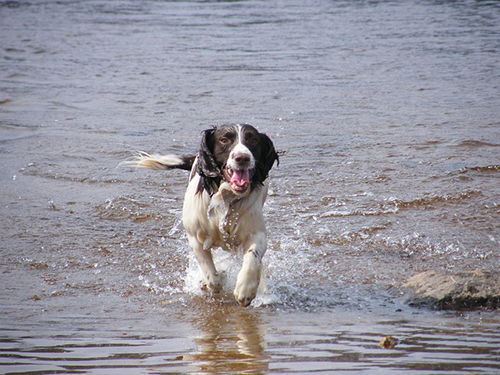
Activity level: High. Springers are considered to be energetic though not hyperactive. The dogs possess incredible stamina; therefore, they require vigorous physical and mental exercise. The first choice to satisfy both needs is hunting. However, a long walk on a leash, an outing in the field, and good quality obedience lessons can go a long way to making the Springer a well-behaved and calm house dog.
Grooming: This breed requires regular brushing and trimming to keep shedding under control and keep the coat from matting. English Springer Spaniels from field other than show lines tend to have less coat.
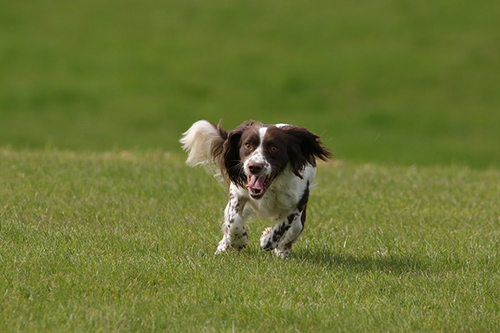
Coat: The outer coat is medium-length and flat or wavy; the shorter undercoat is dense and soft. Moderate feathering on the ears, legs, chest, and belly, with a shorter, fine coat on the head, on the front of the forelegs, and below the hocks on the front of the hind legs. Field-bred springers typically have shorter, coarser, and less feathering.
Color: Black and white or liver and white (black or liver can be the base color, or white can be the base color), with or without tan points; blue or liver roan.
Group: Sporting
Year recognized by the AKC: 1910
- Popularity: Popular
- Family group: Spaniel
- Country of Origin: England
- Date developed: 1800s
- Original purpose: Bird flushing and retrieving
- Today’s purpose: Bird flushing and retrieving, spaniel field trials
- Other names: None
English Springer Spaniel Temperament
This dog is exceptionally intelligent and responsive to training. Springers are often trained for detection work to search for explosives, drugs, weapons, and other contraband items. The active and versatile Springer is friendly, cheerful, and affectionate; also, they make an excellent companion. English Springer Spaniels are devoted to their families and love the company of people.
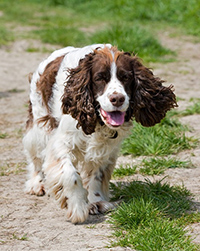
Health
- Main concerns: otitis externa, CHD, elbow dysplasia
- Minor problems: phosphofructokinase deficiency, PRA, retinal dysplasia
- Rarely seen: entropion, rage syndrome, seizures, gastric torsion, patellar luxation, fucosidosis
- Recommended tests: hip, elbow, eye, knee, (DNA for phosphofructokinase deficiency), DNA for PRA
- Life span: 10 to 14 years
- Weight: male – about 50 pounds; female – about 40 pounds
- Height: male – 19 to 21 inches; female – 18 to 20 inches
Breeder and Buyer’s Advice
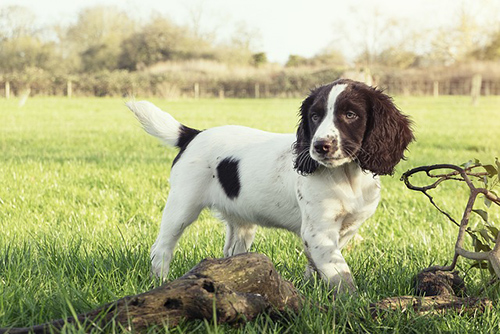
Get familiar with the differences between field dogs and show dogs to find one that fits your personality. Ask the breeder to meet the litter’s parents and choose a puppy with an energy level that fits your lifestyle.
Parent club: English Springer Spaniel Field Trial Association (https://essfta.org/); founded in 1927
Regional clubs: Many regional clubs focus on conformation and performances events, others on hunting and field events, and some offer a combination of these. They are listed on the club’s website.
Rescue: Information about rescue is located on the parent club’s website.

